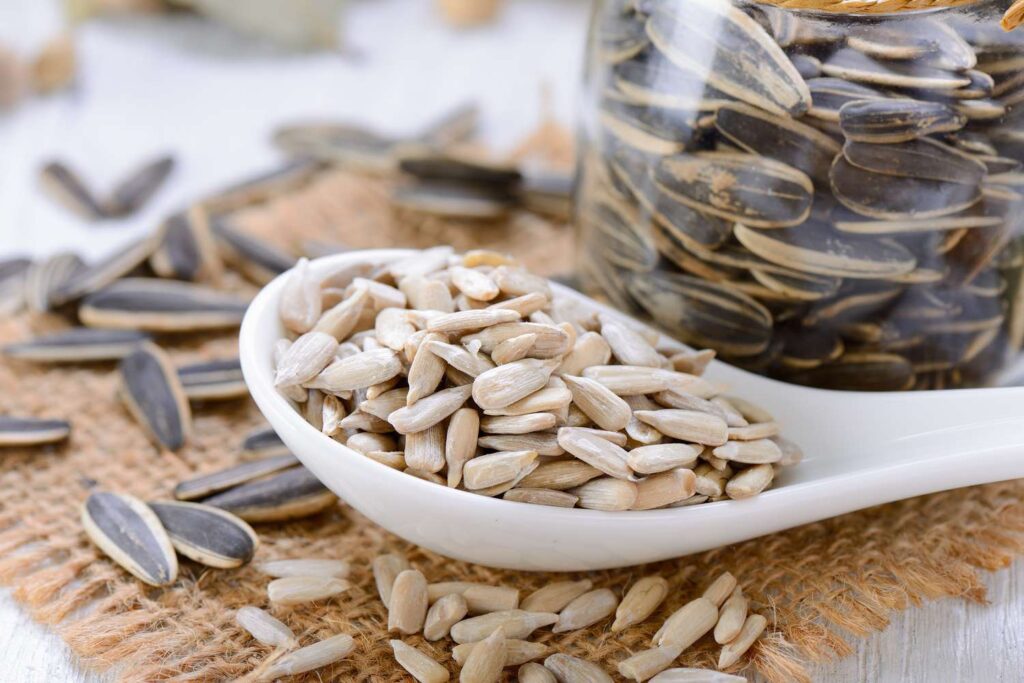Sunflower seeds are a popular snack and an excellent source of essential nutrients. They are derived from the sunflower plant (Helianthus annuus) and are recognized for their high nutritional value. Below is a detailed breakdown of their nutritional content and the various health benefits they offer.
Nutritional Facts (Per 100 grams of Sunflower Seeds)
| Nutrient | Amount |
|---|---|
| Calories | 584 kcal |
| Protein | 20.78 g |
| Total Fat | 51.46 g |
| Saturated Fat | 4.455 g |
| Monounsaturated Fat | 18.528 g |
| Polyunsaturated Fat | 23.137 g |
| Carbohydrates | 20.0 g |
| Fiber | 8.6 g |
| Sugars | 2.62 g |
| Calcium | 78 mg |
| Iron | 5.25 mg |
| Magnesium | 325 mg |
| Phosphorus | 660 mg |
| Potassium | 645 mg |
| Vitamin E | 35.17 mg |
| Vitamin B6 | 1.345 mg |
| Folate (B9) | 227 µg |
| Zinc | 5.0 mg |
| Selenium | 53 µg |
Key Nutrients in Sunflower Seeds
- Healthy Fats:
- Sunflower seeds are rich in polyunsaturated and monounsaturated fats, which are beneficial for heart health.
- They contain linoleic acid (omega-6 fatty acid), essential for healthy skin and overall well-being.
- Protein:
- With over 20 grams of protein per 100 grams, sunflower seeds are a great plant-based protein source, supporting muscle repair and growth.
- Vitamins:
- Vitamin E: A powerful antioxidant that protects cells from oxidative stress and supports skin health.
- B-Vitamins (B6 and Folate): Important for brain function, metabolism, and DNA synthesis.
- Minerals:
- Magnesium: Vital for muscle function, nerve signaling, and bone health.
- Phosphorus: Helps in the formation of bones and teeth, as well as energy production.
- Zinc and Selenium: Crucial for immune health and thyroid function.

Health Benefits of Sunflower Seeds
- Heart Health:
- Sunflower seeds contain healthy fats, particularly monounsaturated and polyunsaturated fats, which reduce bad cholesterol levels (LDL) and lower the risk of cardiovascular disease.
- The magnesium content helps in regulating blood pressure and reducing the risk of heart attacks.
- Anti-Inflammatory Properties:
- Vitamin E acts as a strong antioxidant, reducing inflammation and protecting the body from chronic diseases, such as arthritis and heart disease.
- Supports Weight Loss:
- Although calorie-dense, the high fiber and protein content in sunflower seeds helps keep you full, reducing overall calorie intake and aiding in weight management.
- The fiber also promotes digestive health, preventing constipation and supporting gut health.
- Bone Health:
- Rich in calcium, magnesium, and phosphorus, sunflower seeds contribute to maintaining strong bones and teeth.
- Magnesium is essential for bone density, reducing the risk of osteoporosis.
- Boosts Immune Function:
- Sunflower seeds are rich in zinc and selenium, which help maintain a healthy immune system.
- Selenium also supports antioxidant activity, protecting cells from damage and reducing the risk of infections.
- Skin Health:
- The high Vitamin E content supports healthy skin by preventing oxidative damage caused by free radicals.
- Regular consumption of sunflower seeds can improve skin elasticity and reduce signs of aging.
- Promotes Brain Health:
- The B-vitamins, particularly Vitamin B6 and folate, are critical for brain function. They help in neurotransmitter production, enhancing mood and reducing symptoms of depression.
- Magnesium in sunflower seeds also plays a role in brain function, protecting against stress-related conditions.
- Blood Sugar Control:
- Sunflower seeds have a low glycemic index and contain fiber, which helps in stabilizing blood sugar levels. They may be beneficial for people with diabetes or those trying to manage their blood sugar.
Incorporating Sunflower Seeds Into Your Diet
Sunflower seeds can be consumed in various ways:
- Snack: Eat them raw or roasted as a healthy snack.
- Salad Topping: Add them to salads for an extra crunch and nutrient boost.
- Smoothies: Blend sunflower seed butter into smoothies for extra protein and healthy fats.
- Baking: Use sunflower seeds in baking bread, muffins, or energy bars.
- Cereal or Yogurt: Sprinkle them on top of your breakfast cereals, yogurt, or oatmeal.
Potential Concerns
- Allergies: Some people may be allergic to sunflower seeds. Symptoms include skin rashes, breathing difficulty, or swelling. If you experience these symptoms, consult a healthcare provider.
- Caloric Density: Due to their high fat content, sunflower seeds are calorie-dense. Overeating can lead to weight gain, so moderation is key.
Conclusion
Sunflower seeds are a nutrient-packed snack with numerous health benefits, from heart protection to immune support. Including them in your diet can promote overall well-being, making them a valuable addition to a balanced diet.





